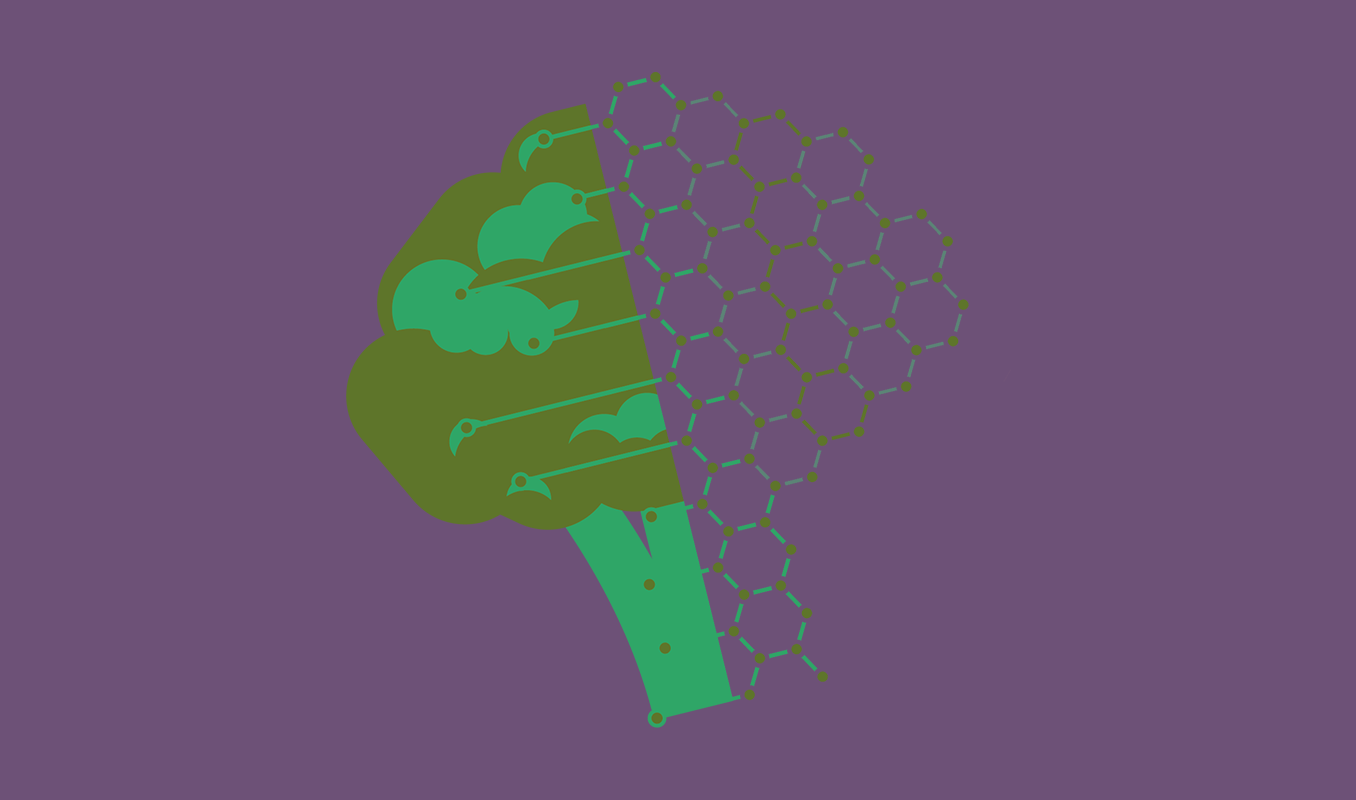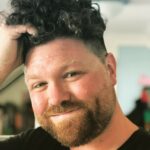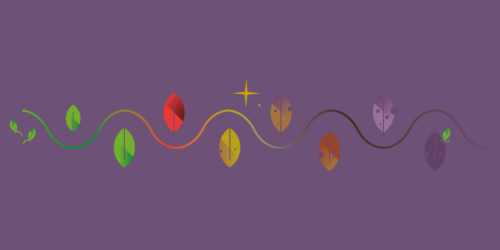
Explore a creative response to scientific research in this Translating Science commission.
Translating Science is a collaborative project which brings seven scientists from the Norwich Research Park together with established writers so that experts within two very different fields of work can gain fresh insight and inspiration from each other.
The scientist welcomed the writer into their world and explained their research, and the writer then went away and responded creatively to what they were shown. The result is a series of stories, poems and essays which will hopefully inspire, excite and trigger a deeper understanding of the benefits of science-based research for solving the many challenges we face, and help to influence policy and decision makers to make the right choices. Read through the rest of our commissions →
Gut: It Grows!
Novelist Alexander Gordon Smith has written a story based on Dr Federico Bernuzzi’s work at the Quadram Institute, which explores cancer prevention using the bioactives found in broccoli. Federico worked with Alexander closely on the idea and plotting of the book.
Gut: It Grows!
Chapter 10
The institute’s brightly lit cafeteria was just as he remembered it.
And so was Peggy.
Sam watched her eat, watched her pull the crusts off her bread and arrange them on her plate, watched her pick at the label on her bottle of Coke Zero while she studied the quiet little dioramas that made up each table. It wasn’t just the world that had broken, he thought. Time had, too.
“So,” she said, her hand shielding her mouth. “You ready to tell me why you called me out of the blue? After all this time? Why you’re suddenly so interested in my work?”
“It’s…” Sam started, realising he should have at least rehearsed this bit. “It’s for a project I’m working on.”
“Another trip?”
He shook his head, seeing Seb, seeing what was left of him, hearing that infernal whisper from the dead man’s throat and somehow finding the words even though there could surely be no space left in his mind for them. What had happened was just too big.
“I remember you telling me we had these things in us, these bacteria or whatever. That they joined us or communicated with us or something. You used to use that quote. No man is an island.”
Peggy laughed, working down the last bit of sandwich. Sam wanted to fill the silence with something else but she held up her hand to ward off his impatience.
“Shows how much you were listening,” she said eventually, running her tongue along her teeth. Her fingers rested on the plastic sandwich pack, popping it again and again and again, like she wanted her words to have a beat. “I never used the quote. I think the quote is bullshit. I mean, maybe not in the way John Donne said it. It’s been a long time since I studied poetry.”
He wanted to tell her it was Shakespeare, but he couldn’t remember if that was right.
“But an island’s a pretty good way of looking at it. You are an island, and you think you’re living there on your own but you’re not. You’re part of something much bigger. You’re not alone, Sam. Not ever.”
“What do you mean?”
Peggy gestured at him with her free hand, the sandwich packet pops dying out, making the cafeteria seem quieter than it should be—only for a few seconds, though, before they started again. It was one of the things that had driven him crazy, he remembered. The noise, the relentless movement. She’d told him it helped her think, but how she’d done both at the same time was anybody’s guess.
“You,” she went on. “This island that you call Sam Hill, this self-proclaimed mono-entity that walks around like god, like his strings aren’t pulled by a trillion other things—things whose collective intelligence, I might add, is significantly greater than his own.”
“Look, Pegg, you’ve lost me,” Sam said. “And I know you always thought I was too stupid to know when I’m being insulted, but honestly, I’m pretty sure that’s what’s happening right now. I didn’t want to upset you, I just asked you for your help.”
And just like that he felt the panic roll back into his chest, the dread of those endless, empty evenings together, the separate beds, the wordless, achingly lonely mornings that they would spend shoulder to shoulder but miles apart. It mixed with the horror of the jungle, too much for him to carry, and he stood up, his chair rocking onto two feet behind him, almost falling.
“It doesn’t matter,” he said. “I’ll find someone—”
Peggy’s hand left the sandwich packet and landed on his, colder than he remembered it being—as cold as Pasco’s had been, standing outside Seb’s tent. She was wearing a ring on her middle finger, he noticed, one he’d never seen before. The stone was an Angara oval, a universe unwinding inside it.
“Sit down,” she said, squeezing gently. “I’m sorry. It’s just weird, seeing you like this.”
He returned to his chair, shunting himself back beneath the table with a chorus of painful screeches that turned the heads of the last few people who remained. Peggy squeezed his fingers one more time then sat back, folding her arms over her chest. Her ID badge caught the light and he saw that she’d changed her name. Of course she had, why wouldn’t she? And yet it still stung. The rings had gone. The name had gone. His stuff had gone, because she’d bagged it all up for him and lobbed it down the stairs nearly a year ago. All that was left was her, which was all there had been when he’d first met her. She’d come full circle. He’d fallen down a hole.
“I meant it about the island,” she said. “What you think of as you, this autonomous, independent being, is a fallacy. It’s just not real. You’re not made up of one organism, you’re made up of an uncountable number of them.”
“In the gut, right?” he said. “That’s what I was asking about, those bacteria.”
“What you think of as you, this autonomous, independent being, is a fallacy. It’s just not real. You’re not made up of one organism, you’re made up of an uncountable number of them.”
“Right. But it’s not just bacteria. You are packed full of fungi too, and viruses. They’re inside you right now, inside everyone. In your intestines, on your skin. And you want to know the weird thing? There are around thirty trillion human cells in your body, but there are over forty trillion bacterial cells.”
“What?”
“Yeah, you’re more bacteria than you are Sam. There’s about five kilograms of them nesting there as we speak, this engine of living matter that occupies this island. As far as they’re concerned, they own the real estate. It’s theirs. You can’t kick them out, and you wouldn’t want to, either. If your microbiome dies, then the chances are you will too. Maybe not straightaway, but eventually. These bacteria keep your gut healthy, your heart, your brain. They keep the bad microbes away. They keep the island afloat.”
“Okay,” Sam said, leaning across the table. “This is good. This helps. But these gut bacteria, they can’t take control of the island, right? They don’t ever pilot the ship?”
“Metaphors are getting a little confusing here,” Peggy said. “And the short answer is we don’t know for sure. But there’s growing evidence that they might. They’re a voice, a loud voice. Even though they’re small, you start singing a song with a trillion other voices then something’s going to hear you.”
Or sing a song with a whisper, he thought, hearing Seb.
Hearing the thing that had stolen his voice.
“Bring it back a bit,” he said, feeling the sweat squeeze through his pores even though the air con was arctic. “You have no idea how tired I am.”
“This is going to be hard to dial back to your level, but I’ll try.”
And she frowned, as if she hadn’t meant for that meanness to surface.
“These microbes can interact with immune cells in your gut,” she said. “In a few different ways. They have a conversation. ‘Hello Mr Immune Cell, how are you today?’”
“You might have dialled back too far.”
She laughed.
“And these immune cells make what are called cytokines. Like a message in a bottle that travels through the blood and eventually reaches the brain. We’ve found gut bacteria in the brain, we know this happens. What we don’t know is what these messages are trying to do.”
“They’re telling us to eat more broccoli, right?” Sam said. “More yoghurt or whatever. What else would they need?”
Peggy shrugged, studying Sam like she’d only just realised who she was talking to.
“Why is this so important?” she asked. “Why now? And why me? I thought I’d be the last person you’d talk to about this.”
Sam glanced across the cafeteria to where the car park sat, drowning in sunshine. A couple more cars had arrived since he’d sat down with Peggy. Was it them? Were they following him? He hadn’t done anything wrong by coming here. Not really. He hadn’t said anything.
“I can’t talk about it,” he replied, his voice low. He stretched further over the table, his chin practically resting on it, but when he opened his mouth to whisper he found that there was nothing there. He pulled back, breathing in through his nose, filling lungs that felt like they’d been empty for weeks. “You just have to trust me.”
And he knew it was the wrong thing to say even before she coughed out an angry laugh. He lifted both hands in an apology that bordered on a hallelujah.
“I’m sorry, Pegg.”
She picked up the sandwich pack, compressing it between her hands as thoroughly and methodically as a car inside a crusher. She held it there, still studying him, as if he was a sample inside one of her petri dishes.
“To answer your question, there are studies that are looking into whether the gut microbiome can influence your health. Conditions like autism, epilepsy, depression, they can all be influenced by what goes on in the gut. I’m not sure if I believe it yet, but why would it be any other way? These things aren’t some foreign invader, they don’t come and colonise your island. They are the island. They are you. You can’t separate them from this thing that we believe to be our one, true self.”
She looked at the ceiling, her tongue running along her teeth, searching for something.
“These things aren’t some foreign invader, they don’t come and colonise your island. They are the island. They are you.”
“They’re right there with you until you die, and—and forgive me, because I’m going to mix the metaphors again—they’re the ones who pack up the show. When all is said and done, when you take your last breath and your brain unloads that final dose of DMT and your soul dreams its way into whatever comes next, these dutiful little workers that have kept you alive and kept you healthy and kept you smiling spread through your slow veins, your silent arteries, and they begin to dismantle you.”
She turned her attention back to him, her eyes glassy.
“What a job that must be, eh? To pull down the walls around you, to shutter the windows, to switch off the lights. Goodbye, Sam Hill. Goodbye, Peggy Sunday.”
She stared at the table, lost somewhere that Sam couldn’t follow.
“They basically eat you,” she said.
She dropped the sandwich pack onto her plate and it began to expand, as if it was trying to repair the damage that she had done to it. It looked almost like a time-lapse film of a flower blooming, each translucent facet pushing out from the core, straining to return itself to where it had started.
It looked like Sebastian too, of course. It looked like the thing that had birthed its way out of the old man’s mouth, his eyes, his nose; the thing that had bulged wetly into the forest of his beard, folding neatly into his eyebrows; the thing that had maddened him, blinded him, choked him, then reached out as if to draw Sam into some pelagic embrace.
The thing that had sung to him in an old man’s voice.
“You never answered my question, Sam,” said Peggy. “Why now, and why me?”
The canteen was emptying out, something unspoken spreading from their table, the same subsonic volcanic rumble that scatters the birds from the trees. Sam turned to the window again to see a big, black car stop right outside, the driver bleached by the sun.
“I just need to know one thing,” he said. “Then I’ll go, I promise. The microbiome, those bacteria and viruses and whatever. Is there something that could, like, change it? Make it multiply, grow out of control. Make it, I don’t know, take over?”
She opened her mouth like she was about to laugh, but she didn’t.
“What’s happened?” she said. “This is something to do with the expedition, isn’t it?”
“I don’t know,” he said. “But it’s bad, Pegg. Sebastian’s dead.”
The shock of it was physical, like she’d been struck.
“He fell, when we were in Vale do Javari. We found a burial site and he fell into it. But that’s not what killed him. He…”
Car doors slamming, and when Sam turned to the window he saw them there.
“Fuck,” he said. “I’m so sorry, I shouldn’t have…”
He stood up, and this time the chair clattered back.
“Just go, Pegg, just get out of here. I didn’t think… I didn’t think they’d follow me.”
“Who?” Peggy said, looking over his shoulder. “Sam, you’re scaring me. Who’s following you?”
He didn’t need to answer. The doors of the canteen opened and Gribble strode in, the same broad smile, the same cold eyes. He wasn’t alone this time, and the men who positioned themselves by the exit didn’t look like they were here for their lunch. Sam held up his hands like he was at gunpoint, knowing that this was somehow much worse.
“Look,” he started. “You didn’t give me any choice.”
“What I gave you was the absolute definition of choice,” Gribble said. He stopped by the table, taking off his glasses and cleaning them with the lining of his jacket. He looked tired, Sam thought. He looked like a man who’d forgotten how to sleep. “Choice one, stay with us, don’t leave, help us find out what the hell is going on. Choice two, go home, lock the door, don’t open your mouth to anyone.”
“I don’t know what this is, but I don’t want any part of it,” Peggy said, pushing herself up.
Gribble sighed, like he was genuinely upset. He slid his glasses back onto his nose.
“I’m very sorry, Miss Sunday, but you’re all out of choices.”
“Hey, I didn’t tell her anything,” Sam said. “Just let her go.”
“You don’t have any right to be here,” Peggy said, fumbling for her phone.
“Don’t make me say it,” Gribble muttered. “It makes me sound like such a dick.”
“Say what?” Peggy said, desperate now.
“That it’s for national security,” Gribble finished. He looked back, an unspoken command that called two of his dogs to the table.
“Sam?” Peggy said.
And what Sam wanted to do was help her. What he wanted to do was beat the shit out of the men so that she could get away.
What he did, though, was stand back.
“Just go with them,” he heard himself say. “It will be easier. You can help. Please, Peggy, it will be okay.”
And the look she gave him broke his heart all over again.
“Get off me,” she said when one of the men touched her elbow. She grabbed her bag, holding it to her chest as she was herded through the door. She didn’t look back.
“She doesn’t need to be involved,” Sam said, his heartbeat like thunder in his skull.
“So why did you involve her?” Gribble replied, talking to a child. “You gonna come nicely, Mr Hill, or do I have to get Matt here to put you over his shoulder.”
Matt didn’t look like he’d have any problem at all with doing just that. Sam flapped his arms, the words he wanted to say leaving his mouth as grunts and sighs, as broken as he was. Gribble nodded, waiting for Sam to take the lead.
“No man’s an island, eh?” he said as he followed. “I heard the whole thing, Sam, and I agree. We’re all in this together. You take a shit, everyone has to swim in it. Now get in the fucking car.”
Read another chapter of Gut: It Grows →
 Alexander Gordon Smith is the award-winning author of thirteen novels for young people, most notably the Escape From Furnace series, which is loved by millions of readers worldwide and which is set to become a Hollywood movie. Other titles include The Inventors, The Fury, The Devil’s Engine and This Book Will Kill You, which is also being adapted for the screen. As Alex Smith he writes the DCI Kett thrillers, which have hit the number one spot on bestseller charts in several countries. He lives in Norwich with his wife and his four daughters, and teaches creative writing around the world.
Alexander Gordon Smith is the award-winning author of thirteen novels for young people, most notably the Escape From Furnace series, which is loved by millions of readers worldwide and which is set to become a Hollywood movie. Other titles include The Inventors, The Fury, The Devil’s Engine and This Book Will Kill You, which is also being adapted for the screen. As Alex Smith he writes the DCI Kett thrillers, which have hit the number one spot on bestseller charts in several countries. He lives in Norwich with his wife and his four daughters, and teaches creative writing around the world.

Dr Federico Bernuzzi is a research scientist working at the Quadram Institute. He undertook his Ph.D. researching bioactives found in broccoli for the maintenance of health. He started his scientific career in 2011 when he joined the University of East Anglia and undertook a Bachelor’s Degree in Biochemistry. As part of that degree, he spent a year working at GlaxoSmithKline (GSK) a world leading pharmaceutical company. Working alongside biostatisticians inspired him to undertake a Master’s Degree in Biostatistics. Throughout his doctorate he has taken part in outreach events including the Norwich Science Festival and writing blogs to promote the health benefits of broccoli and other cruciferous vegetables.
You may also like...
It Comes Through the Air
A Translating Science commission from poet Heidi Williamson, inspired by research from Vincent Were

3rd April 2023
Hardy
A Translating Science commission from scriptwriter and performer Shey Hargreaves, inspired by research from Professor Anne Osbourn

3rd April 2023





